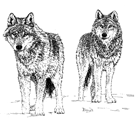Center, Internet, Wildlife Damage Management

Rocky Mountain Wolf Recovery: Annual Reports
Date of this Version
July 2004
Abstract
The state of Colorado expects recovering and dispersing wolf (Canis lupus and C. l. baileyi) populations to reach the state in the near future. Likewise, the western Distinct Population Segment of recovering gray wolves may be delisted soon. In preparation for this eventuality, the Colorado Division of Wildlife (CDOW) has initiated the development of a state wolf management plan in an effort to deal with the many controversial issues surrounding this topic, which includes the possible depredation upon livestock and other domestic animals by wolves. This paper deals specifically with cowcalf and sheep depredation and examines the actual threat to Colorado’s livestock industry as well as the threat to individual ranchers should wolves establish packs in the state. I found that while wolves prefer wild game and are less likely to depredate livestock when game is available, wolves are opportunistic and will depredate livestock. Such depredations will not likely have any detectable negative effect on overall livestock production in the state but individual ranchers could experience significant losses through surplus killing or chronic depredations, with sheep producers more likely to experience such losses. If Colorado desires to monitor the effects of depredations by wolves, qualified staff must be employed and depredation trends monitored to evaluate the impacts. I also found that management of threats to livestock through the development of long-term strategies and identification of threat inducing factors are important for determining future allocations of resources in the application of combinations of wolf management tools to minimize risks to livestock producers. Such strategies will need to be employed along with active wolf management by USDA Wildlife Services or CDOW, particularly in areas where chronic depredations and conflicts do arise (assuming eventual de-listing of the gray wolf from Endangered Species Act protections).


Comments
This white paper was prepared by Michael Francis at the request of CO DoW to assist the deliberations of the CO Wolf Management Working Group. Any opinions expressed are his own and do not represent the opinions of the CO DoW or Meridian Institute. Michael Francis is a Wildlife Biologist/Environmental Specialist with the US Bureau of Reclamation.